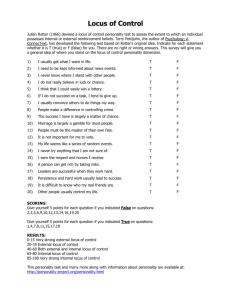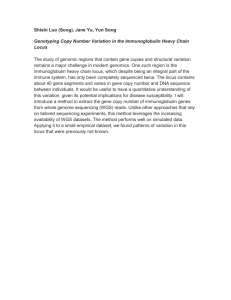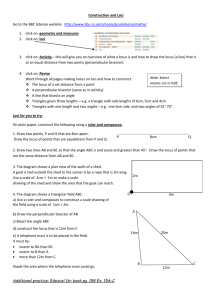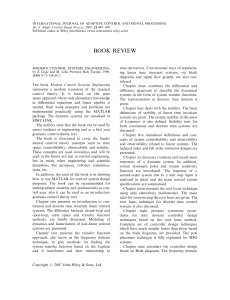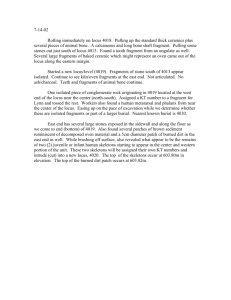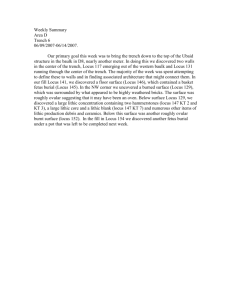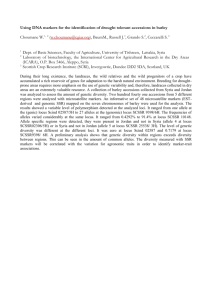Locus control responsibility
advertisement
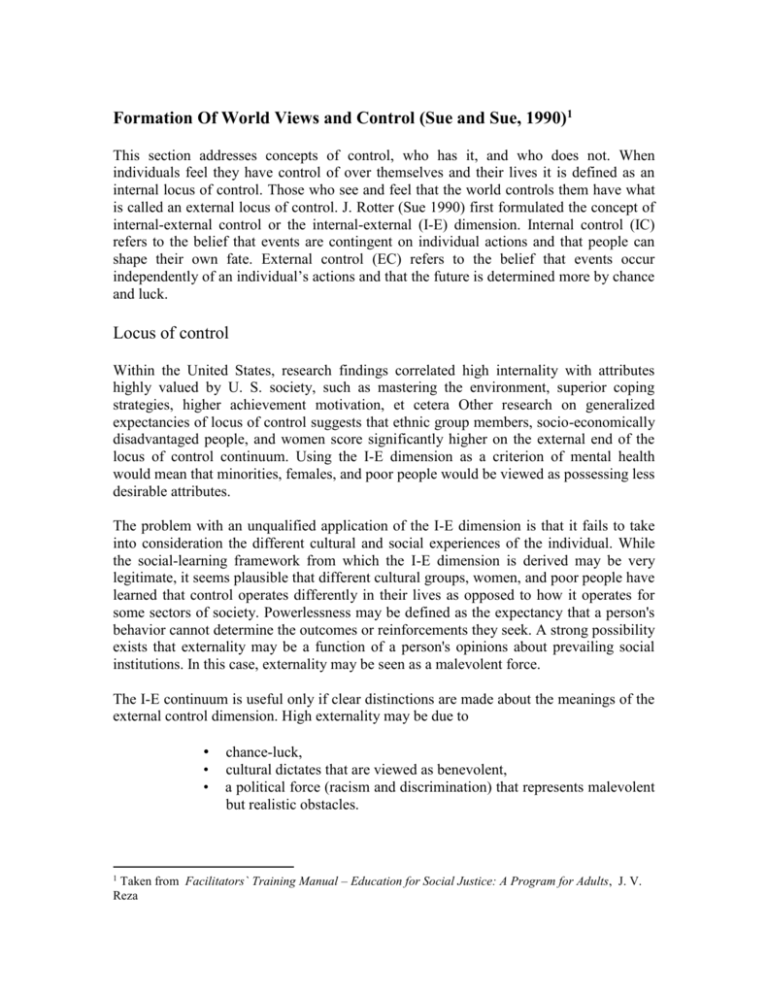
Formation Of World Views and Control (Sue and Sue, 1990)1 This section addresses concepts of control, who has it, and who does not. When individuals feel they have control of over themselves and their lives it is defined as an internal locus of control. Those who see and feel that the world controls them have what is called an external locus of control. J. Rotter (Sue 1990) first formulated the concept of internal-external control or the internal-external (I-E) dimension. Internal control (IC) refers to the belief that events are contingent on individual actions and that people can shape their own fate. External control (EC) refers to the belief that events occur independently of an individual’s actions and that the future is determined more by chance and luck. Locus of control Within the United States, research findings correlated high internality with attributes highly valued by U. S. society, such as mastering the environment, superior coping strategies, higher achievement motivation, et cetera Other research on generalized expectancies of locus of control suggests that ethnic group members, socio-economically disadvantaged people, and women score significantly higher on the external end of the locus of control continuum. Using the I-E dimension as a criterion of mental health would mean that minorities, females, and poor people would be viewed as possessing less desirable attributes. The problem with an unqualified application of the I-E dimension is that it fails to take into consideration the different cultural and social experiences of the individual. While the social-learning framework from which the I-E dimension is derived may be very legitimate, it seems plausible that different cultural groups, women, and poor people have learned that control operates differently in their lives as opposed to how it operates for some sectors of society. Powerlessness may be defined as the expectancy that a person's behavior cannot determine the outcomes or reinforcements they seek. A strong possibility exists that externality may be a function of a person's opinions about prevailing social institutions. In this case, externality may be seen as a malevolent force. The I-E continuum is useful only if clear distinctions are made about the meanings of the external control dimension. High externality may be due to • • • chance-luck, cultural dictates that are viewed as benevolent, a political force (racism and discrimination) that represents malevolent but realistic obstacles. Taken from Facilitators` Training Manual – Education for Social Justice: A Program for Adults, J. V. Reza 1 Locus of responsibility Locus of responsibility measures the degree of responsibility or blame placed on the individual or system. Terms such as person-centered or person-blame indicate a focus on the individual. Those who hold a person-centered orientation (a) emphasize the understanding of a person's motivations, values, feelings, and goal; (b) believe that success or failure is attributable to the individual's skills or personal inadequacies; and (c) believe that there is a strong relationship between ability, effort, and success in society. On the other hand, "situation-centered" or "system-blame" people view the sociocultural environment as more potent than the individual. Social, economic, and political forces are powerful, and success or failure is generally dependent on the socioeconomic system and not necessarily on personal attributes. Formation of world views The following is taken from a workshop handout developed by Olivia Mercado (1990) and is a summation of Sue and Sue’s work on how worldviews develop in oppressed groups. The two psychological orientations, locus of control (personal control) and locus of responsibility, are independent of one another. The focus will be on the political ramifications of the two dimensions. There is an evaluative "desirable-undesirable" quality to each worldview. I. Internal Locus of Control (IC) - Internal Locus of Responsibility (IR) High internal personal control (IC) individuals believe they are masters of their fate and their actions affect the outcomes. Likewise, people high in internal locus of responsibility (IR) attribute their status and life conditions to their own unique attributes; success is due to one's own efforts and the lack of success is attributed to one's shortcomings or inadequacies. A high value is placed on personal resources for solving all problems: selfreliance, pragmatism, individualism, status personally achieved, and power or control over others and nature. The individual is held accountable for all that transpires. II. External Locus of Control (EC) - Internal Locus of Responsibility (IR) Individuals who fall into this quadrant are most likely to accept the dominant culture's definition for self-responsibility but feel they have very little real control over how they are defined by others. Marginal individuals deny the existence of racism; believe that the plight of their own people is due to laziness, stupidity, and a clinging to outdated traditions; reject their own cultural heritage and believe that their ethnicity represents a handicap in Western society, evidence racial self-hatred, accept White social, cultural and institutional standards; perceive physical features of White men and women as an exemplification of beauty; and are powerless to control their sense of self-worth. III. External Locus of Control (EC) - External Locus of Responsibility (ER) A person high in system-blame and external control feels that there is very little one can do in the face of such severe external obstacles as prejudice and discrimination. In essence, the EC response might be a manifestation of (a) having "given up," or (b) an attempt to "placate" those in power. In the former, individuals internalize their impotence even though they are aware of the external basis of their plight. In its extreme form, oppression may result in a form of "learned helplessness.” The dynamics of the one placating, however, are not related to the giving-up response. The best one can hope to do is to suffer the inequities in silence and fear. Life is viewed as relatively fixed, the individual being unable to affect change. Passivity in the face of oppression is the primary reaction of the one placating. IV. Internal Locus of Control (IC) - External Locus of Responsibility (ER) Individuals who score high in internal control and system-focus believe in their ability to shape events in their own life if given a chance. They do not accept the fact that their present state is due to their own inherent weakness. However, they also realistically perceive that external barriers of discrimination, prejudice, and exploitation block their paths to the successful attainment of goals. Pride in one's racial and cultural identity is most likely to be accepted by an IC-ER person. Militancy and cultural separatism or activism and collective social action may also be characteristic of this worldview.
